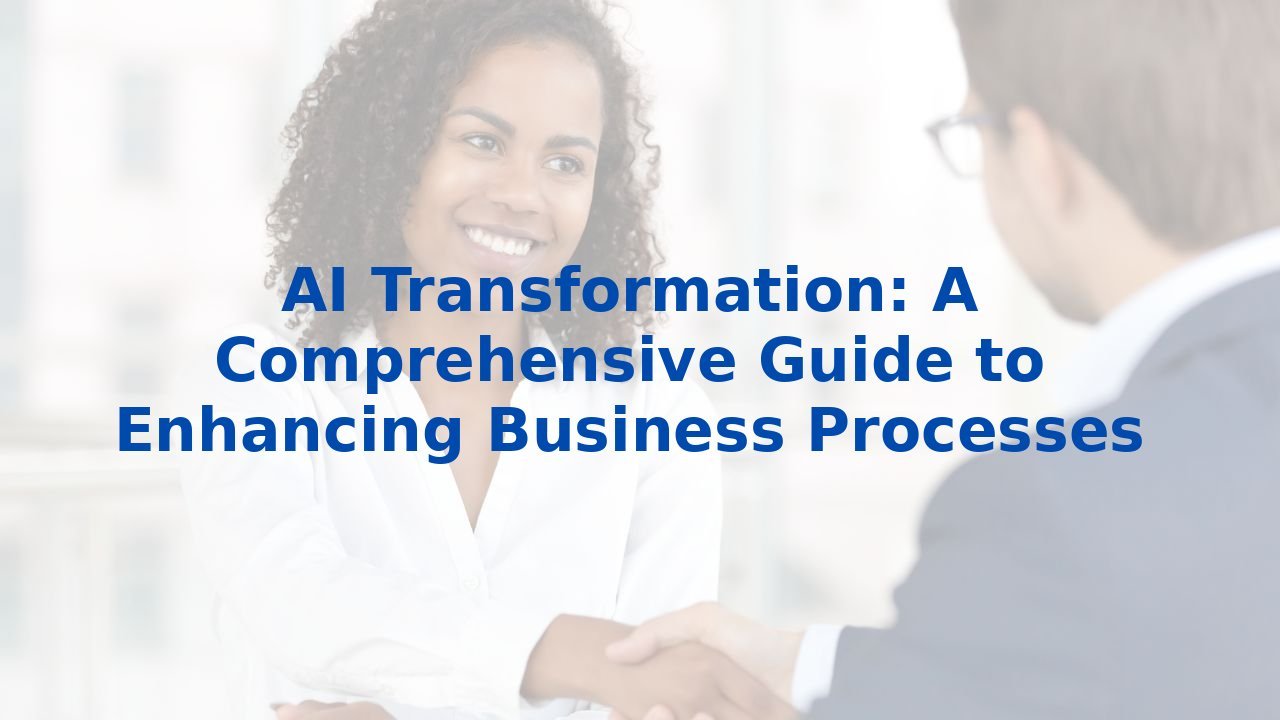AI Transformation: A Comprehensive Guide to Enhancing Business Processes
AI Transformation: A Comprehensive Guide to Enhancing Business Processes
In the increasingly competitive landscape of today's business world, organizations are continuously looking to elevate their efficiency, cut costs, and make informed decisions. At the forefront of these transformative initiatives is Artificial Intelligence (AI). This guide dives into the myriad ways AI can revolutionize business processes, emphasizing its advantages in data analysis, process optimization, and automation.
1. Data Analysis: The Backbone of AI
AI fundamentally redefines data analysis by harnessing the power to process extensive datasets with speed and precision. This capability is a game-changer, enabling organizations to derive actionable insights that inform both tactical and strategic decisions. For instance, AI can dissect customer feedback to pinpoint areas that require enhancement in service delivery, thus ensuring a more personalized experience. As businesses seek to thrive, harnessing AI for data analysis becomes not just beneficial but essential.
2. Process Building: Creating Efficient Workflows
Imagine a tool that can construct the most efficient workflow using previously established data. AI excels at this, transforming how organizations devise and refine processes. By employing machine learning techniques, AI can construct tailored process maps that identify and eliminate bottlenecks. Through this streamlined approach, teams can redirect their energies towards strategic initiatives rather than becoming mired in the minutiae of process construction. AI-driven process mapping provides clarity and a pathway to continuous improvement.
3. Automation: Streamlining Operations
Automation powered by AI stands as one of the most significant advancements in business process management. Robotic Process Automation (RPA) takes charge of repetitive, rule-based tasks that typically consume valuable hours of human effort. From managing data entry to fielding customer service queries, AI-driven automation executes tasks with unmatched accuracy around the clock. This allows human talent to shift focus toward more complex, strategic activities, ultimately enhancing overall operational efficiency.
4. AI in HR: Enhancing Employee Experience
Human Resources is undergoing a renaissance through the integration of AI. By increasing objectivity, AI enhances employee experiences across various HR functions. It aids in salary negotiations by synthesizing data—performance metrics, seniority, budget constraints, and market trends—enabling managers to extend sensitive yet competitive offers. Furthermore, AI-supported recruiting tools streamline candidate evaluation, onboarding processes, and even assist in crafting personalized career development paths for employees, bringing valuable insights for HR decision-making.
5. AI in Sales: Enhancing Sales Processes
The realm of sales is notoriously intricate and fragmented. Here, AI proves invaluable by automating recruitment processes, recommending the best sales channels and prioritizing leads based on probability assessments. Additionally, AI enhances customer interactions through chatbots, delivering consistent information while personalizing sales journeys. This reshapes the sales landscape into a more cohesive and effective pathway, significantly enhancing the customer experience and driving conversion rates.
6. AI for Customer Service: Optimizing Interactions
In the customer service arena, AI emerges as a critical asset. Through analyzing incoming inquiries, it can not only extract key information but also input it into a ticketing system for human follow-up. Chatbots minimize the strain on representative workloads by addressing basic consumer queries, ensuring prompt responses, and ultimately enhancing customer satisfaction. AI's analytical prowess also identifies patterns in customer feedback—acting as a beacon for continuous improvement in service delivery.
7. AI in Product Development: Enhancing Creativity
AI's application in product development is nothing short of revolutionary. Utilizing generative design techniques, AI augments the creative process by generating a multitude of design possibilities based on specified parameters. This capability accelerates innovation while alleviating the challenges and expenses associated with the traditional prototyping process. Particularly in sectors that rely heavily on innovation, it allows organizations to explore diverse avenues of creative potential without incurring substantial development costs.
8. The Value of Training Employees for AI
As AI persists in transforming industries, equipping employees to harness its potentials becomes paramount. Training initiatives should aim not only to familiarize staff with AI tools but also to enhance their understanding of AI-driven insights. By investing in this growth, organizations mitigate the risk of job displacement, thereby transforming employees into strategic players who elevate their organizations' operational landscapes. A well-equipped workforce is a cornerstone for sustained success in this AI-driven era.
Conclusion
The wave of AI transformation is reshaping business processes across various dimensions, from data analysis to automation. Its nuanced applications within HR, sales, and customer service underscore its potential to enhance operational efficiency and improve stakeholder experiences. By embracing AI technologies and committing to employee training, organizations can position themselves favorably in the evolving market landscape, embracing opportunities for continuous growth and innovation.
For more insights on integrating AI into your organization effectively and training your workforce, consider exploring comprehensive resources that can guide you through this transformative journey.



